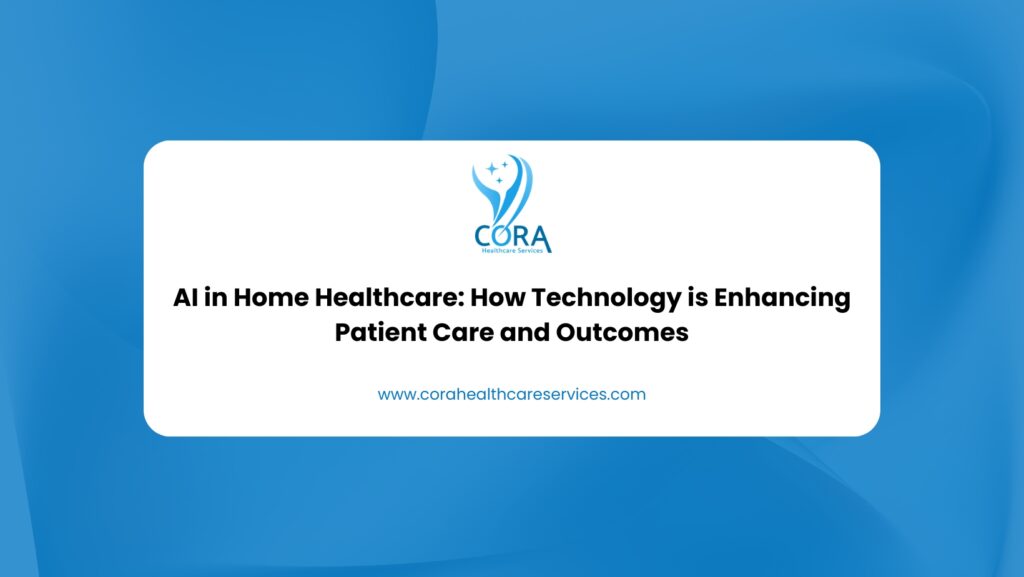Picture this: a home healthcare system where patient monitoring is seamless, personalized care plans are generated in real-time, and nurses receive alerts before emergencies occur. This isn’t a distant dream—it’s the transformative power of AI in home healthcare.
As technology in patient care continues to advance, artificial intelligence (AI) is revolutionizing how care is delivered. These home healthcare innovations are enhancing patient monitoring, improving efficiency, and empowering caregivers to deliver smarter, more tailored support. By focusing on improving healthcare outcomes, AI ensures patients receive proactive, patient-centered care.
At Cora Healthcare Services, we embrace these cutting-edge technologies to provide our clients with the highest quality care, blending compassion with the best of modern innovation.
What is AI in Home Healthcare?
AI in home healthcare involves using intelligent systems to analyze data, make predictions, and assist caregivers in delivering optimal care. It combines cutting-edge technologies like machine learning, natural language processing, and wearable devices to streamline and personalize care.
Key Applications of AI in Home Healthcare
- Predictive Analytics: Identifying potential health risks based on patterns in patient data.
- Smart Monitoring: Devices that track vitals and alert caregivers to anomalies.
- Virtual Health Assistants: AI chatbots providing 24/7 support for patients.
How AI Enhances Patient Care
1. Real-Time Monitoring and Alerts
Wearable devices and sensors powered by AI continuously monitor patients’ vitals, such as heart rate, blood pressure, and oxygen levels. AI analyzes this data and sends alerts to caregivers or healthcare providers if abnormalities are detected.
Example: A patient with hypertension wears a smart watch that notifies their nurse about irregular spikes, enabling prompt intervention and preventing hospitalization.
2. Personalized Care Plans
AI-driven tools analyze patient data to create tailored care plans that adapt to their unique health needs. For example, an AI system might adjust a therapy schedule based on how well a patient is recovering.
Cora Healthcare Services uses data-driven insights to deliver highly personalized care that evolves with the patient’s progress.
3. Enhanced Medication Management
Medication adherence is a common challenge in home healthcare. AI-powered reminders and smart pill dispensers help patients stick to their schedules, reducing errors and improving outcomes.
Did you know? AI systems can also detect potential drug interactions, enhancing patient safety.
AI Benefits for Caregivers and Providers
AI doesn’t just improve patient care—it empowers caregivers and providers with better tools and insights.
1. Reducing Administrative Burden
AI automates time-consuming tasks like documentation, scheduling, and billing, allowing caregivers to focus more on patients.
2. Supporting Decision-Making
Predictive analytics help providers make informed decisions by identifying trends and risks early.
3. Improving Communication
AI-powered platforms facilitate seamless communication between patients, families, and care teams, ensuring everyone stays informed.
AI-Powered Tools in Action
Here’s how AI is revolutionizing home healthcare today:
- Remote Patient Monitoring: AI-powered devices like smart blood pressure cuffs and glucose monitors send real-time data to healthcare providers.
- Fall Detection Systems: Smart sensors detect falls and alert caregivers instantly.
- Chatbots for Support: AI assistants answer patient queries, schedule appointments, and provide basic health advice.
At Cora Healthcare Services, we integrate these tools to provide proactive, efficient care.
Addressing Concerns About AI in Healthcare
While the benefits of AI are clear, some patients and caregivers have concerns about its implementation:
1. Privacy and Security
Patients worry about the safety of their health data.
Solution: AI systems used by trusted providers like Cora Healthcare Services adhere to strict data privacy regulations.
2. Losing the Human Touch
Some fear that technology might replace personal interactions.
Solution: AI is designed to assist—not replace—caregivers, ensuring a balance between efficiency and empathy.
The Future of AI in Home Healthcare
The potential for AI in home healthcare is boundless. Future advancements may include:
- Predictive Health Models: AI systems that foresee chronic conditions before symptoms appear.
- Voice-Activated Assistants: Devices that interact naturally with patients to offer companionship and support.
- Robotic Assistance: AI-powered robots assisting with physical tasks like mobility support or meal preparation.
Cora Healthcare Services is at the forefront of this transformation, ensuring that our patients benefit from the latest innovations in care.
Real Stories: AI Making a Difference
Meet Mark, a 72-year-old recovering from heart surgery. His AI-powered monitoring device detected an irregular heartbeat one night and alerted his nurse, who intervened before it became a critical issue.
“Without this technology, I might have been back in the hospital,” Mark shares. “Now, I feel safer knowing help is always just a step away.”
Take the Leap Toward Smarter Care
AI in home healthcare is more than a technological advancement—it’s a revolution in how we approach patient care. By integrating AI-driven tools, providers like Cora Healthcare Services can deliver care that’s proactive, personalized, and efficient.
Ready to Experience the Future of Care?
Contact Cora Healthcare Services today to learn how AI can enhance your home healthcare experience. Together, we’ll harness the power of technology to improve outcomes and elevate your quality of life.

